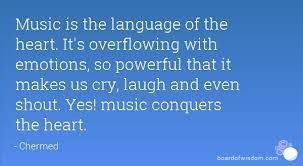Music: is an art form and cultural activity whose medium is sound organized in time. The common elements of music are pitch(which governs melody and harmony), rhythm(and its associated concepts tempo, meter and articulation), dynamics ( loudness and softness), and the sonic qualities of timbre and texture( which are sometimes termed the "color" of a musical sound)
Music psychology, or the psychology of music may be regarded as a branch of both psychology and musicology. It aims to explain and understand musical behaviour and experience, including the processes through which music is perceived, created, responded to, and incorporated into everyday life.
With the understanding of music and music psychology, it will be better to understand the main aim of this post which is music and emotions, how music affects our emotions as human beings.

Within the factors affecting emotional expression in music tempo is typically regarded as the most important, but a number of other factors, such as mode, loudness, and melody, also influence the emotional valence of the piece.
Fast tempo: happiness, excitement, anger.
Slow tempo: sadness, serenity.
The study of music and emotion seeks to understand the psychological relationship between human affect and music. It is a branch of music psychology with numerous areas of study, including the nature of emotional reactions to music, how characteristic of the listener may determine which emotions are felt, and which components of a musical composition or performance may elicit certain reactions. The field draws upon and has significant implications for such areas as philosophy, musicology, music theory and aesthetics, as well the acts of musical composition and performance.
We all can agree that the type of music we listen to influences our current emotional state, just imagine or try to remember the time you were feeling down, and then you listen to Taylor Swift song "shake it off", the fast tempo of the song and its lyrical wordings will make you forget about your worries by 'shaking it off' and dancing to the music, which may bring about emotions of happiness, excitement as stated earlier.
Or this other situation where you listen to one of Ed sheeran's song "Photograph", you tend to begin to think about your boyfriend/girlfriend, and if your single the thought of being in a relationship will be playing in your mind.
In understanding this, let's move to the topic which is:

CONVEYING EMOTION THROUGH MUSIC
The ability to perceive emotion in music is said to develop early in childhood, and improve significantly throughout development The capacity to perceive emotion inusic is also subject to cultural influences, and both similarities and differences in emotion perception have been observed in cross-cultural studies. Empirical research has looked at which emotions can be conveyed as well as what structural factors in music help contribute to the perceived emotional expression. There are two schools of thought on how we interpret emotion in music

Cognitivists's approach argues that music simply displays an emotion, but does not allow for the personal experience of emotion on the listener.
Emotivists: argue that music elicits real emotional responses in the listener
It has been argued that the emotion experienced from a piece of music is a multiplicative function of structural features and contextual features of the piece shown as:
Experienced Emotion=structural features × performance features × listener features × contextual features
Where:
Structural features= segmental features × suprasegmental features performance features= performer skill × performer state
Listener features= musical expertise × stable disposition × current motivation
Contextual features= location × event
Music and Relationships

As odd as it may sound, music helps and plays a role in relationships, as we can all agree that over 80% of songs releases are based n love, and as the saying goes "where words fail, music speaks".
So when you having a fight with your girlfriend and feel like she doesn't want your love, sing to her Justin Bieber "let me love you" or any of Ed sheeran love songs.
There is no harm in experimenting with music concerning your relationships, might be surprised how far it will help, just remember "when words fail music speaks"

Music goes a long way in affecting our emotions, and I hope this article has helped in enlightening the effects of music in ones emotional health, with this you can use music as a form of treatment when having emotional disturbances.
Listening to slow tempo songs will help calm you down, and high tempo songs will help in giving you excitement, happiness. So today and every other day make music you best friend by listening to it daily, so trap a headset, earpiece and feel your body with positive emotions, as music is a key to feeling good and living longer.

Hi! I am a robot. I just upvoted you! I found similar content that readers might be interested in:
https://en.wikipedia.org/wiki/Music_and_emotion
Excellent post, well done.
Feel free to read more about the effect of music
https://steemit.com/life/@nirgf/music-affects-our-brain-what-your-musical-taste-says-about-your-personality